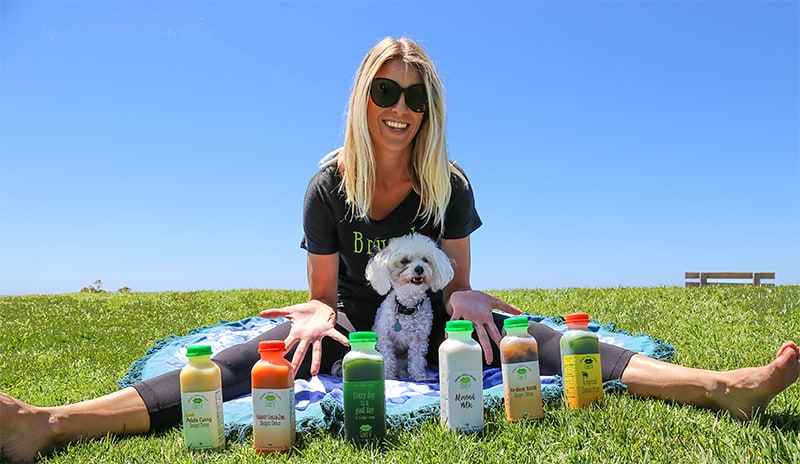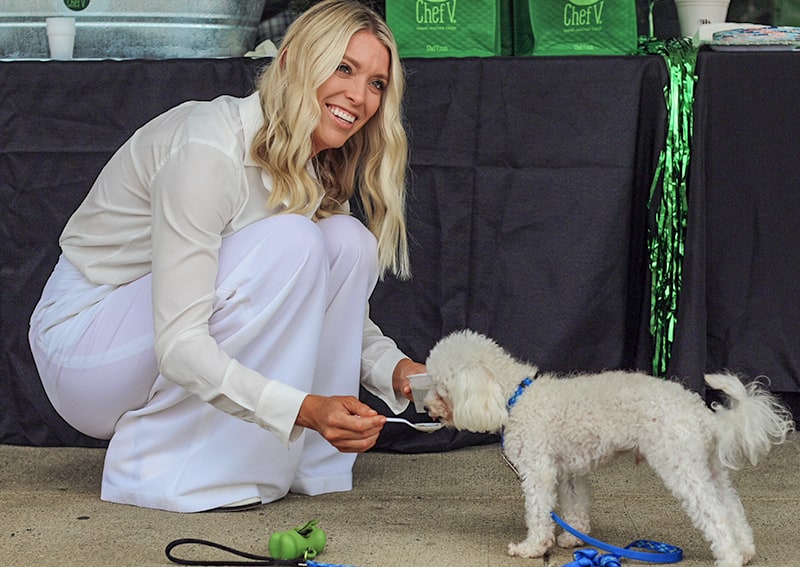
No offense to you if you’re on my Green Drink Plan …
But my favorite Green Drink customer of all time is Coconut.
He’s my five pound, six-year old canine kid (a toy maltipoo). That’s right, Coconut sips on Green Drink.
Just as Green Drinks support the health of bipeds like you and me, lapping up some cold-blended dark leafy greens can benefit your four-legged furry best friend.
In this article, I’ll highlight:
- The foods you never want to feed your dog
- What the research shows about feeding foods other than meat to canines
- Tips on how to best prepare veggies to ensure easy digestion for your dog
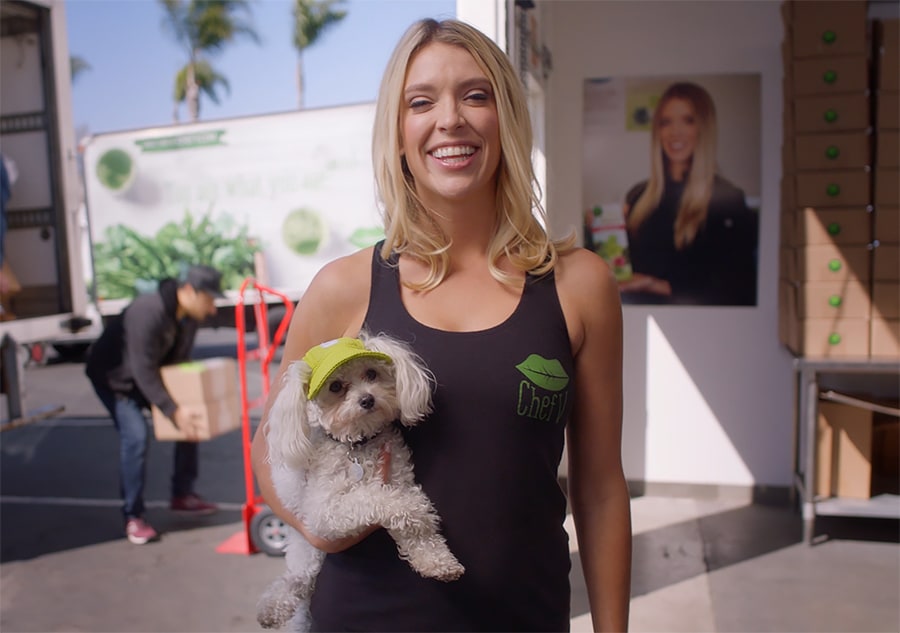
Are Vegetables Necessary For Dogs?
Not if you go according to mainstream advice. For instance, WebMD’s pet website, FETCH, says that if you purchase a brand of dog food that contains the seal of approval from the Association of American Feed Control Officials (or AAFCO), it means it offers a balanced diet.
But to me, that’s like saying if you purchase packaged human food from the supermarket that meets the criteria for the USDA Food Pyramid, it’s adequate for human consumption. And with the continuing rise in metabolic disorders such as diabetes and obesity, we all know how the federal government’s nutrition guidelines are working out for society….
The article on FETCH says that because all the nutrition dogs need is already in their food, you don’t have to worry about giving them vegetables to get a balanced meal.
But in my opinion, if I want Coconut to not just survive but thrive, Green Drink it is. Now considering he only weighs as much as a 2-liter bottle of soda, Coconut doesn’t need 16 ounces a day like I do.
The fact is that dogs live such short lives. It’s one of my biggest beefs I have with the universe. Hopefully, with exercise and a little bit of Green Drink and other healthy food, Coconut will live to a ripe old age of 20 or so.
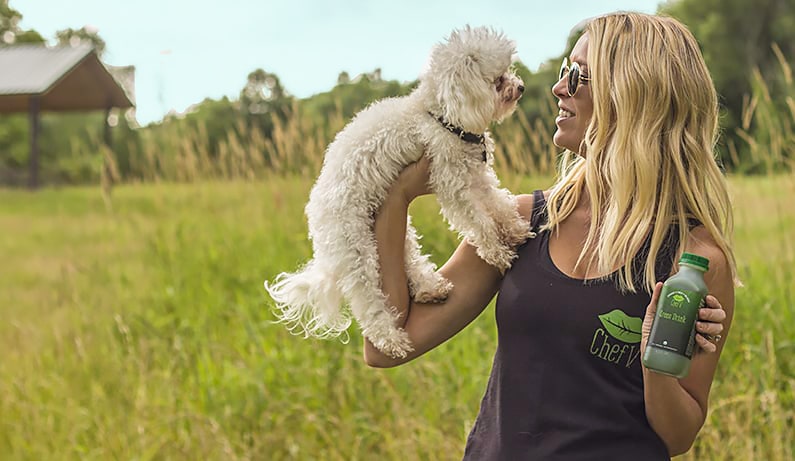
Give Dogs These Veggies But Don’t Feed Them These…
Carrots, green beans and broccoli are some of the most popular veggies that dogs can safely eat.
But by no means should you ever give your dogs the following:
- Beans and other legumes
- Potatoes
A research article published in the Journal of Animal Science says that in July 2018, the Food and Drug Administration (FDA) warned about a possible relationship between a heart condition called dilated cardiomyopathy (DCM) in dogs and the consumption of dog food formulated with potatoes and pulse ingredients. (Pulses are legumes like lentils.)
The popularity of feeding veggies to dogs has increased because of the same reason more people are eating organic human food. More and more dog owners have become conscious about the connection between the health of their pet and the quality of the food their pets eat.
For instance, some of the questionable ingredients in dog food include wheat gluten, corn, grains like rice, meat by-products and preservatives.
There are other ingredients that like beans and potatoes may seem harmless. But in reality, they can cause digestive upset or worse in dogs. These include:
- Chocolate
- Citrus
- Artificial sugars
- Coconut oil (Sorry, Coconut, no coconut oil for you!)
- Grapes and raisins
- Nuts
- Milk, cheese and other dairy products
- Onions
- Garlic (Your dog probably wouldn’t take onion or garlic from you anyway.)
Best Way To Give Veggies To Your Dog
According to the Journal of Animal Science, pet dogs have dietetically evolved much differently than their wild wolf ancestors. Whereas wild wolves consume a very high-protein diet, domesticated canines like my fluffball Coconut can much better metabolize carbs. The research article suggests that dogs consume a diet that’s about 30% protein.
That means that there’s plenty of room to add veggies in your dogs diet. In fact, the research article’s co-authors say, “The inclusion of whole food ingredients in natural pet foods as opposed to the fractionated ingredients [in commercial pet food] may result in higher nutrient concentrations, including phytonutrients.”
The article adds, “The processing of commercial pet food can negatively impact digestibility, nutrient bioavailability, and safety….”
But you shouldn’t just hand feed your dog a huge piece of raw broccoli or carrots. Even if your dog would eat raw veggies, chances are the food would pass mostly undigested. And perhaps your poor poochy would have an accident in your home because it’s not used to eating raw veggies.
So the best way to give your dog a little dose of whole, unprocessed veggies is the same way I like eating my veggies: lightly steamed or pureed.
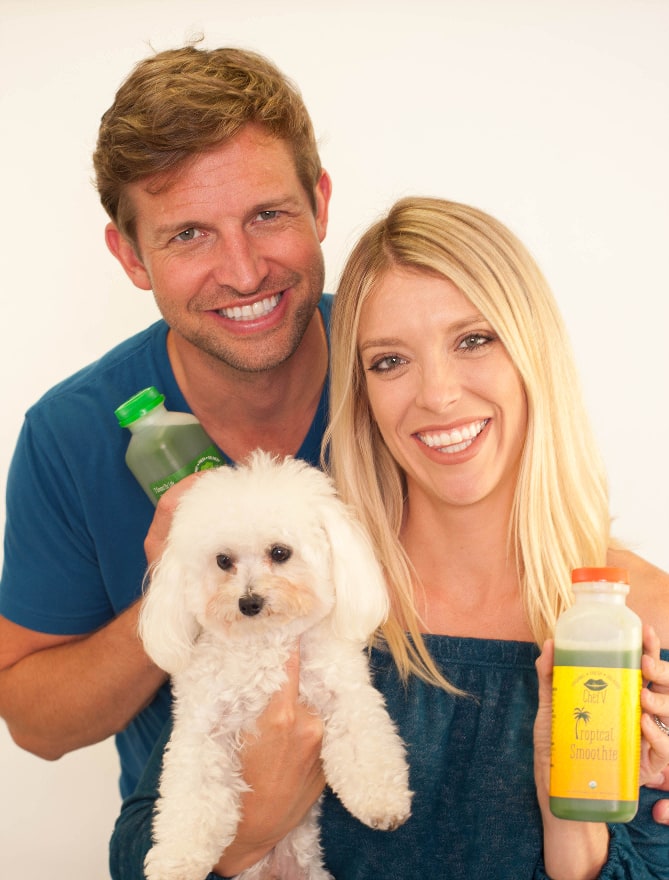
Research On Feeding Veggies To Doggies
I found one interesting study in the Journal of the American Veterinary Society. It looked at the effects of vegetable consumption and vitamin supplementation on the risk of developing bladder cancer.
Sorry, Coconut. The dogs involved in the study weren’t toy maltipoo but Scottish Terriers. The owners of 92 adult scottish terriers with bladder cancer completed a questionnaire regarding their dogs’ diet and intake of vitamin supplements in the year prior to being diagnosed with cancer.
Dogs who ate veggies three times a week—especially green leafy veggies—had the lowest associated risk of developing bladder cancer.
I’ll drink Green Drink to that.
And so will Coconut.
